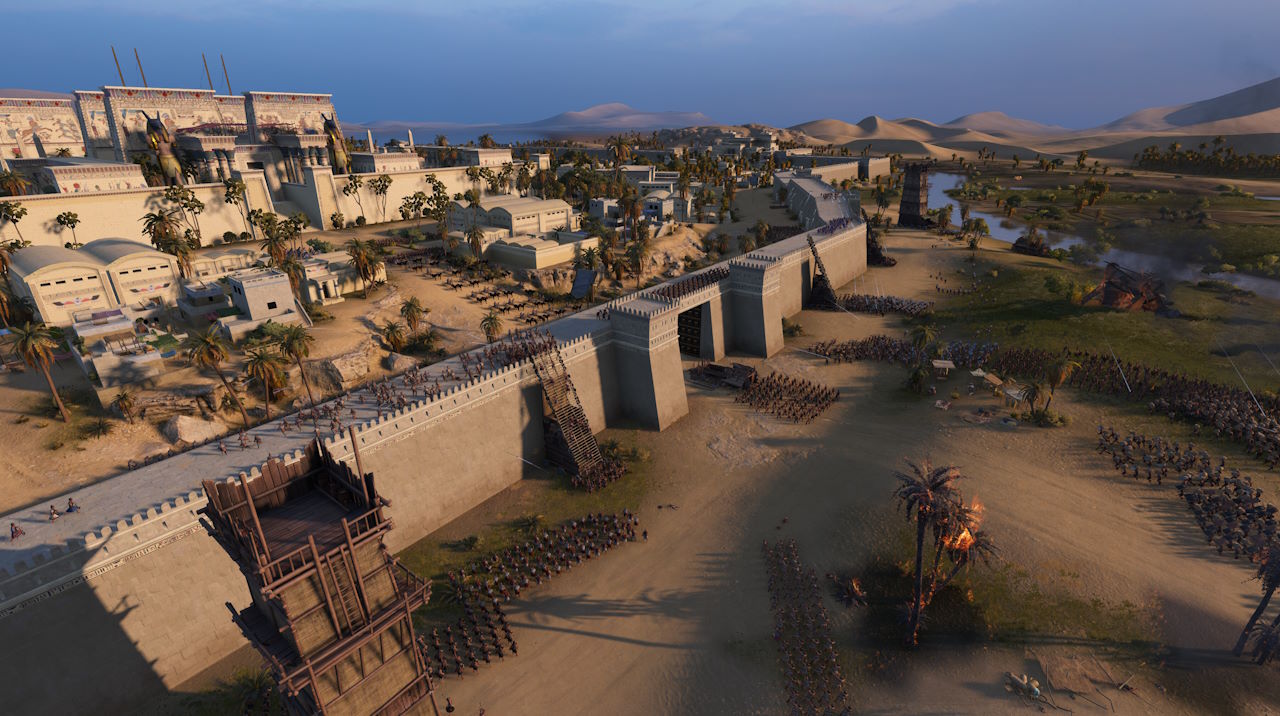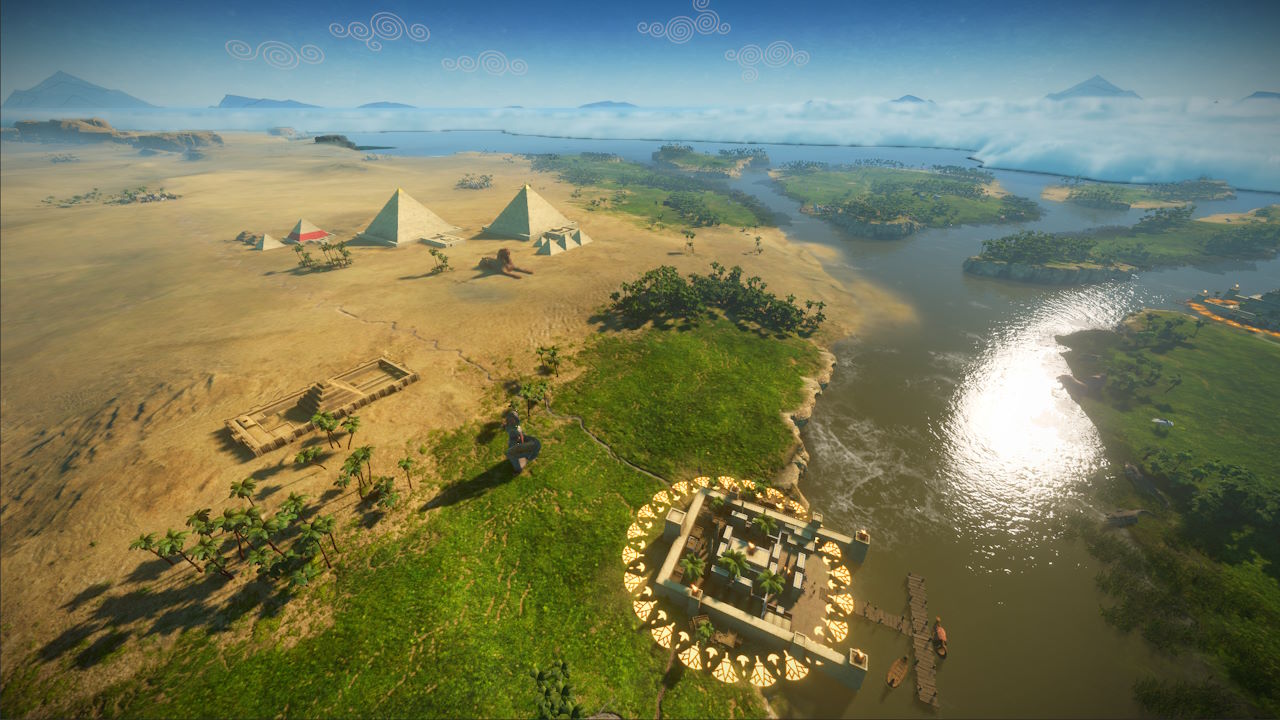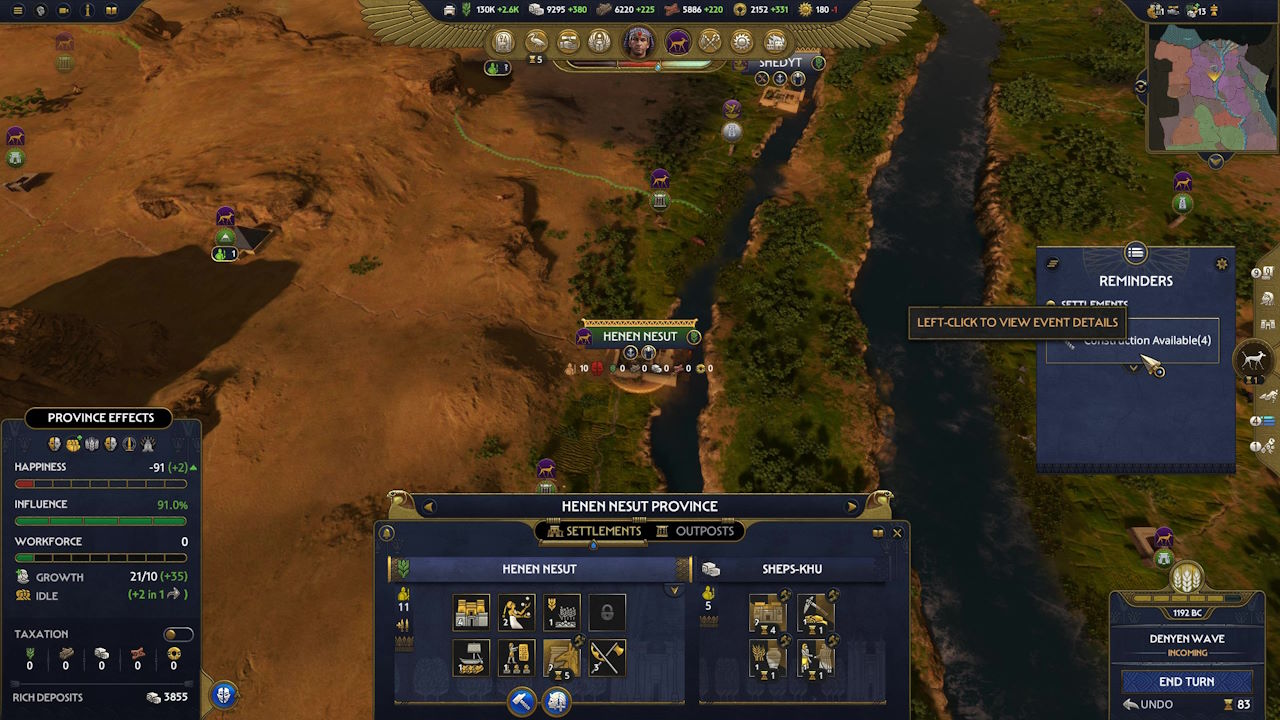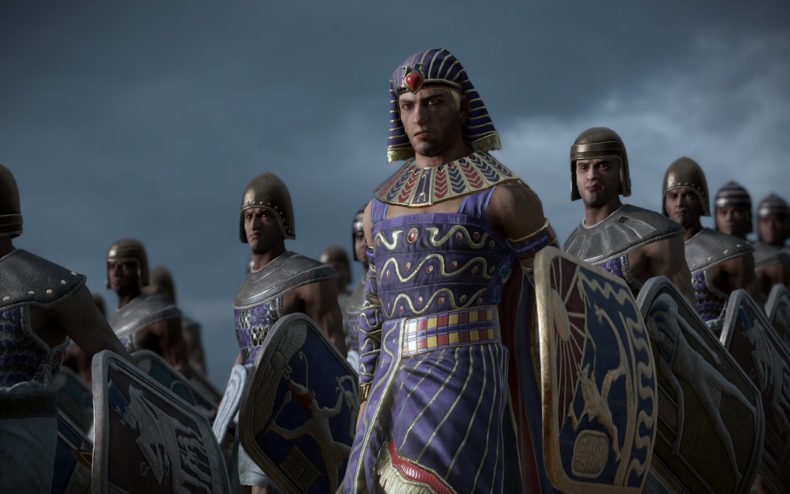October 11, 2023
It seems appropriate to open a review for Total War: Pharaoh with the following proverb:
“Be industrious, let thine eyes be open, lest you become a beggar, for the man that is idle cometh not to honor.”
Not least because of its ancient Egyptian origins, but because it encapsulates pretty well the ethos of the Total War series. You’re constantly busy, whether it’s managing your resources, taking part in large battles, or simply considering which adversary to undermine next. And Total War: Pharaoh will have you at your busiest yet, for better and worse.
So yes, ancient Egypt is the setting this time around, with the current Pharaoh Merneptah sensing the end of his reign, and various potential successors eyeing up his vacant throne like circling vultures. You choose a hero and faction to plan to become the next Pharaoh after his inevitable demise. Or not, as soon becomes apparent, as Total War: Pharaoh sets its stall out slightly differently.
There have always been different approaches to victory throughout the Total War series, but in Pharaoh, your options feel dialled up to an ancient 11. First, as you progress with your expanding army, you have to decide if you actually wish to contest the throne of Pharaoh, because that isn’t your only option. You can also go the way of the Great King of Hatti, an area to the north and east that threatened to end the Egyptian civilisation during its Bronze Age. Whilst overall victory conditions remain largely similar, it’ll mean conflict on a different area of the map and different aspects of the game will alter slightly depending on your decision.

The biggest thing affecting your successful ascension is a Legitimacy score; a rating which mainly increases by winning battles and conquering new lands. This spreads respect among the lands for your name and thus improves your legitimacy for the top position in the land – whichever one you choose. In practice, it’s a method of ranking your current success against enemy factions. Being a raging warlord isn’t the only way to leverage legitimacy though. Various buildings and wonders can be constructed to boost your validity, as can your scheming in the Royal Court by concocting plots against other court members and currying favour with others to further your position.
Continue your campaign and you’ll unlock Ancient Legacies, which give you the option to emulate ancient Egyptian heroes and receive various boons based on who you choose. You are however locked in with your selection for the whole campaign. Will you choose the aggressive Thutmose III to emulate to capture new regions with ease or perhaps the diplomatic Hatshepsut for significant trade boosts around the land? On my first playthrough, I opted for Thutmose, seemingly the most relatable to my general plan for domination in most Total War games. But even after this selection, I could still tailor how I went about conquering new lands – would I garner support from the locals and rally them to my cause, or sow seeds of division from within? One time a balanced approach of the two allowed me to capture the city without a battle even taking place.
While doing this you’ll need to keep your eyes on another central mechanic: the Pillars of Civilisation. This is a metric of stability and is maintained by upgrading the main culture centre of each area; think the main capital building. The more upgraded these are, the more stable society is. The trouble is, as factions vie for land, these centres get destroyed and need to be rebuilt which lowers their standing and they take time to return to their former glory. Before long the entire land can be plunged into collapse if you’re not careful. This means everyone’s nemesis, the Sea Peoples, will appear and raid and pillage your land for giggles, and the more desperate the Pillars situation, the stronger and more numerable their advances may be. Survive this onslaught and you may just see victory.

‘May just’, indeed, because even victory is a nuanced and selective beast in Total War: Pharaoh. That’s because Victory is awarded by collecting Victory points. Achieving a set amount nets you a Minor Victory, earn more to net a Major Victory, and then achieve a hat full for that elusive Ultimate Victory. You earn these points for claiming the crown, conquering cities, and achieving other criteria and you can check your progress at any time. Again it allows you to tailor your game to how you want to achieve victory.
If it feels like it’s taken a long time to discuss how to even win at Total War: Pharaoh, that is intentional. It’s not just a long game, but a complex one, and one whose variety offers an unheard-of level of tweaking, personalisation, and replayability. And that’s before we’ve discussed managing various resources, town happiness, taxation, worshipping the land’s numerous deities, the upgrade tree, or diplomacy. It’s a beast of a game with so much to do.
And, honestly, it’s a lot to take in and juggle. The first time you play it, you’ll likely get lost despite the excellent tutorialising we’ve come to expect from the franchise. So many different terms and new mechanics to balance on top of what was already a balancing act may prove too much for some, and it means Total War: Pharaoh is unlikely to be a good starting point for people into the franchise. That said, when it clicks, you feel like an absolute boss for managing to juggle everything down to the fine details, and now I get it all, I’m thrilled to play it all and truly tweak my options in future playthroughs to fully explore the variety on offer, knowing I’m clear on which are the important levers to pull.

Outside of this micromanagement though, comes the battling. There have been some improvements here, but in some ways it feels less of a progression than the main campaign overhaul, given the number of additions there. For battle, the main difference in Total War: Pharaoh is dynamic weather and terrain. The weather can change, and with it brings various debuffs to troops. Rain or extreme heat will hamper both sides, but it can also change the terrain and make it hotter or wetter to move through, and this also affects the troops on the ground fighting for your glory. In reality, you get a handy weather forecast, which details what the weather is and what it is likely to change to. You can wait for the weather to change – essentially a weather re-roll – to try your luck at a calmer outcome. It’s a nice little addition, but one I found added more frustration than intrigue, and mainly I would just pray for a nice cool, sunny day.
Outside of all the changes, this is still the Total War series you know and love. Those battles are still fun, frantic, strategic, and satisfying, as is the chess-like out-thinking of the various factions in the overworld as you execute your dominance. Because of the sheer amount going on, it certainly feels like a slower game – if such a thing were possible – as there’s more to monitor and consider. And as per usual, your turn count will easily enter three figures as you slowly take control of Egypt, especially if you’re working toward that Ultimate Victory.
So, with Total War: Pharaoh, more is certainly the order of the day. It’s pleasing to see a Total War game feel different because of the carefully considered campaign structure and the various ways you can tailor your approach to your ultimate goal. Total War: Pharaoh isn’t for newcomers, but there’s something for every Total War fan in here somewhere. It still has that “How have I been playing this for six hours straight!?” vibe in droves like the best in the series with progress coming slowly, but at just enough pace to keep you yearning for more. It’s not quite the best in the series, given it takes a while to truly click, but when it does, conquering ancient Egypt has never felt so good.
Epic story and time period
Plenty of customisation to personalise your campaign
Packed full of content
Satisfying and tactical battles
Overwhelming to begin with
Battles don't feel as "new" as other aspects
Total War: Pharaoh lets you play your way, and throws a lot at you to deal with. Fans will lap it up once they get to grips with its new mechanics.





